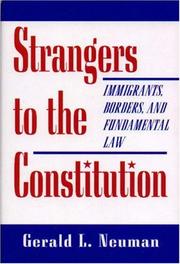| Listing 1 - 10 of 121 | << page >> |
Sort by
|

ISBN: 1134773269 1280319623 0203437659 9780203437650 0203745892 9780203745892 9781280319624 0415138515 9780415138512 9780415138529 0415138523 9781134773213 9781134773251 9781134773268 1134773250 Year: 1996 Publisher: London ; New York : Routledge,
Abstract | Keywords | Export | Availability | Bookmark
 Loading...
Loading...Choose an application
- Reference Manager
- EndNote
- RefWorks (Direct export to RefWorks)
Since re-unification, fears of resurgent German nationalism have mounted. O'Brien argues that these fears are exaggerated, and documents a longstanding, steadily increasing commitment to the liberal policies of the Basic Law which protects foreigners.
Nationalism --- Liberalism --- Racism --- Xenophobia --- Noncitizens --- Germany --- Ethnic relations. --- Aliens --- Enemy aliens --- Expatriates --- Foreign population --- Foreign residents --- Foreigners --- Illegal aliens --- Illegal immigrants --- Non-citizens --- Resident aliens --- Unauthorized immigrants --- Undocumented aliens --- Undocumented immigrants --- Unnaturalized foreign residents --- Persons --- Legal status, laws, etc.
Book
ISBN: 1316322947 1316309568 110741511X 1316329623 1316332969 1316326284 131631958X 110774198X 1107071119 1316316246 1316288854 Year: 2015 Publisher: Cambridge : Cambridge University Press,
Abstract | Keywords | Export | Availability | Bookmark
 Loading...
Loading...Choose an application
- Reference Manager
- EndNote
- RefWorks (Direct export to RefWorks)
What difference does law make in immigration policymaking? Since the 1970s, networks of progressive attorneys in both the US and France have attempted to use litigation to assert rights for non-citizens. Yet judicial engagement - while numerically voluminous - remains doctrinally curtailed. This study offers new insights into the constitutive role of law in immigration policymaking by focusing on the legal frames, narratives, and performances forged through action in court. Challenging the conventional wisdom that 'cause litigation' has little long term impact on policymaking unless it produces broad rights-protective principles, this book shows that legal contestation can have important radiating effects on policy by reshaping how political actors approach immigration issues. Based on extensive fieldwork in the United States and France, this book explores the paths by which litigation has effected policy change in two paradigmatically different national contexts.
Emigration and immigration law --- Aliens --- Noncitizens --- Enemy aliens --- Expatriates --- Foreign population --- Foreign residents --- Foreigners --- Illegal aliens --- Illegal immigrants --- Non-citizens --- Resident aliens --- Unauthorized immigrants --- Undocumented aliens --- Undocumented immigrants --- Unnaturalized foreign residents --- Persons --- Legal status, laws, etc.
Book
ISBN: 9813362006 9813361999 Year: 2021 Publisher: Gateway East, Singapore : Springer,
Abstract | Keywords | Export | Availability | Bookmark
 Loading...
Loading...Choose an application
- Reference Manager
- EndNote
- RefWorks (Direct export to RefWorks)
Aliens --- Enemy aliens --- Expatriates --- Foreign citizens (Aliens) --- Foreign population --- Foreign residents --- Foreigners --- Noncitizens --- Resident aliens --- Unnaturalized foreign residents --- Persons --- Deportees --- Exiles --- Immigrants --- Refugees --- Legal status, laws, etc. --- Illegal aliens --- Illegal immigrants --- Non-citizens --- Unauthorized immigrants --- Undocumented aliens --- Undocumented immigrants

ISBN: 0691043604 9786612752391 1400821959 1282752391 1400812798 9781400812790 9780691043609 Year: 1996 Publisher: Princeton, N.J. Princeton University Press
Abstract | Keywords | Export | Availability | Bookmark
 Loading...
Loading...Choose an application
- Reference Manager
- EndNote
- RefWorks (Direct export to RefWorks)
Gerald Neuman discusses in historical and contemporary terms the repeated efforts of U.S. insiders to claim the Constitution as their exclusive property and to deny constitutional rights to aliens and immigrants--and even citizens if they are outside the nation's borders. Tracing such efforts from the debates over the Alien and Sedition Acts in 1798 to present-day controversies about illegal aliens and their children, the author argues that no human being subject to the governance of the United States should be a "stranger to the Constitution. "Thus, whenever the government asserts its power to impose obligations on individuals, it brings them within the constitutional system and should afford them constitutional rights. In Neuman's view, this mutuality of obligation is the most persuasive approach to extending constitutional rights extraterritorially to all U.S. citizens and to those aliens on whom the United States seeks to impose legal responsibilities. Examining both mutuality and more flexible theories, Neuman defends some constitutional constraints on immigration and deportation policies and argues that the political rights of aliens need not exclude suffrage. Finally, in regard to whether children born in the United States to illegally present alien parents should be U.S. citizens, he concludes that the Constitution's traditional shield against the emergence of a hereditary caste of "illegals" should be vigilantly preserved.
Aliens --- Civil rights --- Emigration and immigration law --- Etrangers --- Droits de l'homme --- Emigration et immigration --- Droit --- Noncitizens --- Enemy aliens --- Expatriates --- Foreign population --- Foreign residents --- Foreigners --- Illegal aliens --- Illegal immigrants --- Non-citizens --- Resident aliens --- Unauthorized immigrants --- Undocumented aliens --- Undocumented immigrants --- Unnaturalized foreign residents --- Persons --- Legal status, laws, etc.

ISBN: 9681205588 6075640444 Year: 1994 Publisher: El Colegio de México
Abstract | Keywords | Export | Availability | Bookmark
 Loading...
Loading...Choose an application
- Reference Manager
- EndNote
- RefWorks (Direct export to RefWorks)
Ésta es una macrohistoria de México, desde la perspectiva de los extranjeros que inmigraron al país y de los mexicanos que emigraron de él, basada mayormente en fuentes primarias impresas, fuentes inéditas y monografías. En el tercer volumen (1910-1970) se estudia la Revolución mexicana, boxer según los extranjeros afectados por ella, nacionalista según el gobierno mexicano y grandes sectores populares. En la década de los veinte regresa a México buen número de mormones que se habían refugiado en Estados Unidos, y llegan menonitas, judíos, sirios y libaneses, principalmente. La crisis de 1929 expulsó a muchos mexicanos de Estados Unidos y a muchos chinos de México, sobre todo del noroeste. Con la explosión demográfica y la segunda guerra mundial cobra una fuerza aún mayor la emigración de los braceros a Estados Unidos. Sin embargo, en la década de los cuarenta llegan los españoles republicanos; a partir de los cincuenta, estadunidenses jubilados, y en los setenta veteranos de la guerra de Vietnam.
Aliens --- Mexicans --- History. --- Mexico --- History --- Ethnology --- Enemy aliens --- Expatriates --- Foreign citizens (Aliens) --- Foreign population --- Foreign residents --- Foreigners --- Noncitizens --- Resident aliens --- Unnaturalized foreign residents --- Persons --- Deportees --- Exiles --- Immigrants --- Refugees --- Legal status, laws, etc. --- Illegal aliens --- Illegal immigrants --- Non-citizens --- Unauthorized immigrants --- Undocumented aliens --- Undocumented immigrants --- History of the Americas

ISBN: 968120557X 6075640339 Year: 1994 Publisher: El Colegio de México
Abstract | Keywords | Export | Availability | Bookmark
 Loading...
Loading...Choose an application
- Reference Manager
- EndNote
- RefWorks (Direct export to RefWorks)
Ésta es una macrohistoria de México, desde la perspectiva de los extranjeros que inmigraron al país y de los mexicanos que emigraron de él, basada mayormente en fuentes primarias impresas, fuentes inéditas y monografías. En el segundo volumen, ya establecida la libertad de cultos, se abre una atmósfera liberal que disminuye el problema de escoger entre inmigrantes sajones y latinos. Entre los primeros sobresale la colonización mormona; entre los segundos, la italiana. El tradicional recelo frente a los estadunidenses transforma la xenofilia en xenofobia. Además, la creciente salida de braceros a Estados Unidos confirma que México es un país de emigración y no de inmigración.
Aliens --- Mexicans --- History. --- Mexico --- History --- Ethnology --- Enemy aliens --- Expatriates --- Foreign citizens (Aliens) --- Foreign population --- Foreign residents --- Foreigners --- Noncitizens --- Resident aliens --- Unnaturalized foreign residents --- Persons --- Deportees --- Exiles --- Immigrants --- Refugees --- Legal status, laws, etc. --- Illegal aliens --- Illegal immigrants --- Non-citizens --- Unauthorized immigrants --- Undocumented aliens --- Undocumented immigrants --- History of the Americas

ISBN: 9681205561 6075640320 Year: 1993 Publisher: El Colegio de México
Abstract | Keywords | Export | Availability | Bookmark
 Loading...
Loading...Choose an application
- Reference Manager
- EndNote
- RefWorks (Direct export to RefWorks)
Ésta es una macrohistoria de México, desde la perspectiva de los extranjeros que inmigraron al país y de los mexicanos que emigraron de él, basada mayormente en fuentes primarias impresas, fuentes inéditas y monografías. En el primer volumen se estudia desde la victoria de Santa Anna y de Mier y Terán que impidió la reconquista española en 1829; la independencia de Texas (1836); la victoria francesa de 1838 y la estadunidense, una década después, hasta las diversas inmigraciones de franceses, barcelonetes, belgas, italianos e incluso rusos, pasando por los cien mil mexicanos que se convirtieron en extranjeros en su propia tierra.
Aliens --- Mexicans --- History. --- Mexico --- History --- Ethnology --- Enemy aliens --- Expatriates --- Foreign citizens (Aliens) --- Foreign population --- Foreign residents --- Foreigners --- Noncitizens --- Resident aliens --- Unnaturalized foreign residents --- Persons --- Deportees --- Exiles --- Immigrants --- Refugees --- Legal status, laws, etc. --- Illegal aliens --- Illegal immigrants --- Non-citizens --- Unauthorized immigrants --- Undocumented aliens --- Undocumented immigrants --- History of the Americas
Book
ISBN: 1633558282 1492815365 Year: 2012 Publisher: [Place of publication not identified] : Start Publishing LLC,
Abstract | Keywords | Export | Availability | Bookmark
 Loading...
Loading...Choose an application
- Reference Manager
- EndNote
- RefWorks (Direct export to RefWorks)
"Every century has its advantages and its drawbacks," he said. "We, for instance, have bred out sexual desire. And, as for you people ..."
Time travel --- Aliens --- Enemy aliens --- Expatriates --- Foreign citizens (Aliens) --- Foreign population --- Foreign residents --- Foreigners --- Noncitizens --- Resident aliens --- Unnaturalized foreign residents --- Persons --- Deportees --- Exiles --- Immigrants --- Refugees --- Legal status, laws, etc. --- Illegal aliens --- Illegal immigrants --- Non-citizens --- Unauthorized immigrants --- Undocumented aliens --- Undocumented immigrants

ISBN: 0415931924 9781136711633 1136711635 9780203951798 0203951794 9780415931922 9781136711589 9781136711626 9781138977594 1136711627 Year: 2002 Publisher: New York Routledge
Abstract | Keywords | Export | Availability | Bookmark
 Loading...
Loading...Choose an application
- Reference Manager
- EndNote
- RefWorks (Direct export to RefWorks)
Using qualitative research methods and evidence gathered from interviews, this work explores and highlights contradictions between Japanese immigration and immigrant policies as they relate to ethnic Japanese ""returnees.""
Aliens --- Globalization. --- Immigrants --- Labor policy --- Latin Americans --- Japan --- Ethnic relations. --- Global cities --- Globalisation --- Internationalization --- International relations --- Anti-globalization movement --- Latinxs --- Ethnology --- Emigrants --- Foreign-born population --- Foreign population --- Foreigners --- Migrants --- Persons --- Enemy aliens --- Expatriates --- Foreign residents --- Illegal aliens --- Illegal immigrants --- Non-citizens --- Noncitizens --- Resident aliens --- Unauthorized immigrants --- Undocumented aliens --- Undocumented immigrants --- Unnaturalized foreign residents --- Legal status, laws, etc.
Book
ISBN: 1351689800 1315169738 1351689797 1138049182 0367888807 9781351689809 9781315169736 9781351689793 Year: 2017 Publisher: London [England] ; New York, New York : Routledge,
Abstract | Keywords | Export | Availability | Bookmark
 Loading...
Loading...Choose an application
- Reference Manager
- EndNote
- RefWorks (Direct export to RefWorks)
Noncitizens have always been present in liberal political philosophy. Often hard to situate within traditional frameworks that prioritise citizenship, noncitizens can appear voiceless and rightsless, which has implications for efforts towards global justice and justice in migration. This book proposes an alternative. Noncitizenism identifies an analytical category of noncitizenship. While maintaining the importance of citizenship, noncitizenship is another form of special individual-State relationship. It operates far from a State, at its borders, and within its territory, providing a tool for examining the continuity between sites of engagement and the literatures, questions, and conclusions relating to them. The book argues that an accurate liberal theoretical framework, and one which can address contemporary challenges, must acknowledge the political relationship of noncitizenship between individuals and States. This book is for students and scholars of political philosophy and for those interested in noncitizenship and how it can inform the response of liberal theory, citizenship, global justice, migration studies, political theory and policy work.
Aliens --- Citizenship --- Philosophy. --- Enemy aliens --- Expatriates --- Foreign citizens (Aliens) --- Foreign population --- Foreign residents --- Foreigners --- Noncitizens --- Resident aliens --- Unnaturalized foreign residents --- Persons --- Deportees --- Exiles --- Immigrants --- Refugees --- Legal status, laws, etc. --- Illegal aliens --- Illegal immigrants --- Non-citizens --- Unauthorized immigrants --- Undocumented aliens --- Undocumented immigrants
| Listing 1 - 10 of 121 | << page >> |
Sort by
|

 Search
Search Feedback
Feedback About UniCat
About UniCat  Help
Help News
News